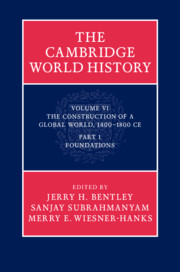Book contents
- The Cambridge World HistoryVOLUME VI
- The Cambridge World History
- The Cambridge World History
- Copyright page
- Dedication
- Contents
- Figures
- Maps
- Tables
- Contributors
- Preface
- 1 Introduction
- Part One Global matrices
- Part Two Macro-regions
- Part Three Large-scale political formations
- 11 The Iberian empires, 1400 to 1800
- 12 Imperial competition in Eurasia: Russia and China
- 13 The Islamic empires of the early modern world
- Part Four Crossroads regions
- Part Five Overview
- Index
- References
11 - The Iberian empires, 1400 to 1800
from Part Three - Large-scale political formations
Published online by Cambridge University Press: 05 May 2015
- The Cambridge World HistoryVOLUME VI
- The Cambridge World History
- The Cambridge World History
- Copyright page
- Dedication
- Contents
- Figures
- Maps
- Tables
- Contributors
- Preface
- 1 Introduction
- Part One Global matrices
- Part Two Macro-regions
- Part Three Large-scale political formations
- 11 The Iberian empires, 1400 to 1800
- 12 Imperial competition in Eurasia: Russia and China
- 13 The Islamic empires of the early modern world
- Part Four Crossroads regions
- Part Five Overview
- Index
- References
Summary
- Type
- Chapter
- Information
- The Cambridge World History , pp. 271 - 296Publisher: Cambridge University PressPrint publication year: 2015
References
Further reading
- 1
- Cited by



